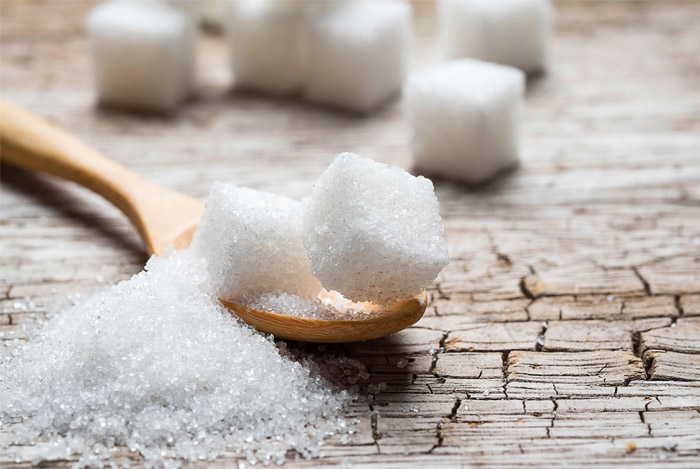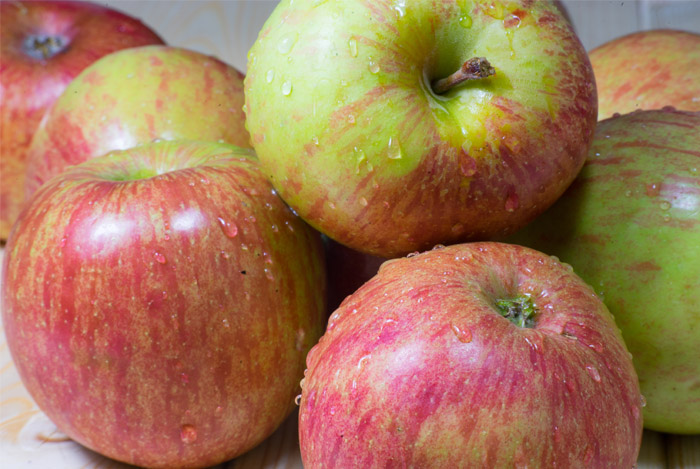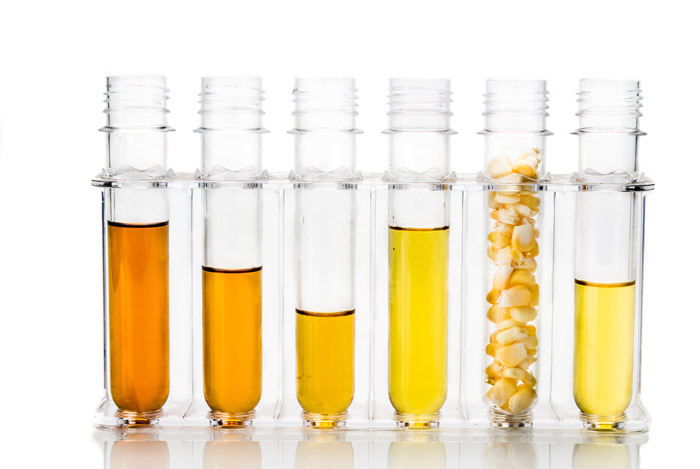You know how people are always looking for new health crazes that might save or extend their lives? At the same time, they’re also looking for the bad guys – the foods and other products they want to avoid at all costs.
If you’ll humor me, imagine a great big glowing arrow directing the attention of the health-conscious masses from one substance to the next, indicating whether it’s healthy or deadly.
More and more now, that arrow points with fury to fructose, one of the many forms of sugar that has slowly become a significant portion of our diets. It’s now being blamed for the obesity epidemic, as well as the prevalence of diabetes and other chronic diseases.
Is fructose the true villain in our story, leading to steep declines in health throughout Western civilization, or is it yet another red herring? Let’s find out.
What is Fructose?
 Fructose is a simple sugar that gives fruits their sweet taste. Originally marketed as a health supplement, fructose became available as a common ingredient in foods around 20 years ago. It comes in two forms outside of fruit, crystalline fructose and high-fructose corn syrup, or HFCS.
Fructose is a simple sugar that gives fruits their sweet taste. Originally marketed as a health supplement, fructose became available as a common ingredient in foods around 20 years ago. It comes in two forms outside of fruit, crystalline fructose and high-fructose corn syrup, or HFCS.
Americans get their sugar in two main forms – from table sugar and high-fructose corn syrup. The latter is one I’ve mentioned in other articles on this site, typically in strongly worded tones of warning.
So what are these sugars, exactly?
Table sugar is also known as sucrose. Sucrose is actually the result of a molecular bond between glucose and fructose – two similar simple sugars with slightly different atomic structures. High-fructose corn syrup is very similar, made of the same components, but has been artificially tweaked.
While glucose can comes from starches like potatoes, our bodies also produce it. Every cell in existence on this planet uses glucose for energy.
Fructose is not so common. The only time we’ve ever eaten it historically is when fruits we consumed were in season. Fructose is about twice as sweet as glucose.
In the 1960s, the US corn industry developed new techniques for converting corn-derived glucose into fructose in order to produce high-fructose corn syrup. The end result was a substance that was 55% fructose, 42% glucose, and 3% other sugars.
Because this new concoction was more fructose than glucose, it presented a more appealing and inexpensive alternative to traditional sucrose gathered from sugarcane and beets.
How Does the Body Process Sugars?
 Sugars are handled by the body in a few different ways, in some cases the polar opposite of one another.
Sugars are handled by the body in a few different ways, in some cases the polar opposite of one another.
When we eat sucrose, the enzymes in our intestines break it down into fructose and glucose – the same happens with high-fructose corn syrup. But the way the body treats each individual compound of either sugar, once broken down, is completely different.
Glucose moves its way through the bloodstream and supplies the cells in our tissues with energy. All of our cells are able to convert glucose into energy without a hitch. Fructose, on the other hand, is only converted to energy by liver cells.
This means the body can only metabolize fructose through one organ that ends up seriously taxed after a heavy load. If you eat too much fructose, your liver may hardly be capable of its other necessary functions, which can lead to the production of uric acid – a substance linked to high blood pressure and kidney stones, as well as gout.
The body is normally capable of strictly regulating the amount of glucose in the blood, keeping it at levels necessary to keep all of its functions running smoothly. Glucose tells the pancreas to create the hormone insulin, which helps to remove glucose from the blood. Insulin also encourages the production of leptin, a hunger-suppressing hormone.
But fructose, again, is another story. Fructose does not cause the body to produce insulin, and instead raises the levels of ghrelin, a hormone that keeps us hungry.
A recent study found that people were more interested in reaching for foods with a higher calorie content after they had a drink containing fructose, compared to when they had a drink containing glucose.
24 participants were given drinks sweetened with 75 grams of fructose one day, and on another day they were given drinks with the same amount of glucose. They were asked to rate their hunger upon viewing images of high-calorie foods like cookies, pizza, cheeseburgers, and candy – and how much they wanted to eat each of the foods.
When the participants consumed fructose, they reported feeling hungrier and showed more interest in the high-calorie foods than when they consumed glucose.
Other studies have shown that both oral and intravenous glucose administration to the body have resulted in lower levels of ghrelin. Excess fructose in the diet has also been linked to fat deposits in the liver, which can lead to non-alcoholic fatty liver disease.
And last but not least, studies have shown that sugar in general may be incredibly addictive, effecting the brain in ways similar to that of cocaine and heroin.
What About Fruit?
 The most common natural source of fructose is fruit. And, with all this talk about how bad fructose is for the body, a likely conclusion to make is that fruit must therefore be terrible for you. Right?
The most common natural source of fructose is fruit. And, with all this talk about how bad fructose is for the body, a likely conclusion to make is that fruit must therefore be terrible for you. Right?
Not quite. The majority of the studies done on the effects of fructose and glucose have focused on added sugar, not the kind found naturally occurring in fruit.
And, these studies are looking primarily at the effects of consuming copious amounts of fructose. It’s pretty hard to overeat fructose by eating too much fruit.
Fruit does contain fructose, but it’s also an excellent source of fiber and water. Because of these factors, fruits take longer to eat and digest. This means fructose hits the liver more slowly over time, and the fruit itself will be much more filling. That’s why most people feel their hunger has been satisfied after eating a single large apple containing 23 grams of sugar – 13 of which are fructose.
Looking at it from an evolutionary standpoint, we have been consuming fruit for millions of years. The fiber in it can reduce cholesterol levels and slow the absorption of carbohydrates that help to increase the feeling of being full. Some studies have even linked fiber – especially soluble fiber – to weight loss.
So no, there’s no reason to consider excluding fruit from your diet just because you’re worried you may be consuming too much fructose. Fruits are an important part of a well-balanced diet, just don’t go overboard.
The Scientific Community’s Take on Fructose and HFCS
 At this point we can be sure that fructose itself is particularly troublesome. The glowing arrow is mostly correct. The body doesn’t handle it nearly as well as it does glucose, and it may actually be increasing the amount of food we end up eating. But what is the scientific consensus on the dangers of both fructose on its own and the dreaded high-fructose corn syrup?
At this point we can be sure that fructose itself is particularly troublesome. The glowing arrow is mostly correct. The body doesn’t handle it nearly as well as it does glucose, and it may actually be increasing the amount of food we end up eating. But what is the scientific consensus on the dangers of both fructose on its own and the dreaded high-fructose corn syrup?
The American Medical Association passed a resolution at its annual conference in 2008 that stated there was insufficient scientific evidence to indict high-fructose corn syrup as a unique contributor to obesity. They also added that the scientific literature on the subject was a little lacking, and would likely require more study. So, more studies were done.
In 2012, the Academy of Nutrition and Dietetics concluded that the research done on high-fructose corn syrup was now far more conclusive, revealing that there was “little evidence that HFCS differs uniquely from sucrose and other nutritive sweeteners in metabolic effects.”
Scientific American pointed out one of the key problems with the arguments against fructose, saying that “concern about fructose is based primarily on studies in which rodents and people consumed huge amounts of the molecule – up to 300 grams of fructose each day, which is nearly equivalent to the total sugar in eight cans of Coke – or a diet in which the vast majority of the sugars were pure fructose.”
These studies were not done by taking into consideration the amount of fructose a regular person would be consuming on a daily basis. They were more focused on determining the exact effects fructose has on the body, something more easily recognized when consumed in those huge amounts.
The American Journal of Clinical Nutrition concluded that yes, fructose is problematic when it comes to energy intake regulation, but these problems are no more present in high-fructose corn syrup than they are in regular table sugar.
Many scientists also take issue with the way people try to find and point out – using that giant, glowing arrow – one key player and blame it for everything wrong with them. This is being done now with sugar, and David Klerfeld, a Human Nutrition national program leader for the USDA, told ABC News:
“So many things have happened in our environment in the past fifty years, from a total increase in calories to a decrease in activity – it’s absurd to pin the entire obesity problem on a single food such as fructose or even sugar consumption as a whole. Why aren’t we focusing on ginormous portions rather than wasting time looking at single ingredients?”
Fructose, it would appear, does have negative health effects – but it would be irresponsible and plain wrong to blame it for all our problems. As to whether you receive yours through table sugar or the ever-present HFCS, the differences between the two are yet to be known. On that count, it seems there’s little else to do but wait for more studies.
Should You Avoid Fructose?
 While the scientific community might be trying to reinforce the notion that we still aren’t sure whether fructose is any worse for your health than regular sugar, the fact remains: sugar is not good for you. Especially when considering the amounts the average person in Western society consumes.
While the scientific community might be trying to reinforce the notion that we still aren’t sure whether fructose is any worse for your health than regular sugar, the fact remains: sugar is not good for you. Especially when considering the amounts the average person in Western society consumes.
Because of the effects that fructose does have on keeping you hungry for worse foods, coupled with the fact that excessive consumption of any form the sweet stuff can lead to a laundry list of negative health effects, I remain consistent in my recommendation that you severely limit your intake of fructose. You can find energy elsewhere.
I always underscore the importance of a well-balanced diet in these blogs because that is truly one of the surest ways to achieve great health. You need that mixture of strong proteins, nutritious carbs, and essential fats if you want to grow up to be big and strong. If you’re already big and strong, there’s still no reason to give up on this basic formula.
But don’t go away from this with the idea that fructose should be your new nemesis. You can still consume it in naturally occurring low to moderate amounts in fruits and vegetables, and even the occasional light snack. But don’t make a habit of it, and be mindful at all times of what you’re putting into your body.
Keep paying attention to that big arrow, though. The more we learn about our bodies, the more certain we’ll be about which foods to go for, and which ones to stay far away from.
How do you feel about the ongoing fructose debate? Leave your thoughts in the comments below!
The post The Lowdown on Fructose and its Deadly Health Effects appeared first on Nutrition Secrets.
http://www.nutritionsecrets.com/the-lowdown-on-fructose-and-its-deadly-health-effects/
No comments:
Post a Comment